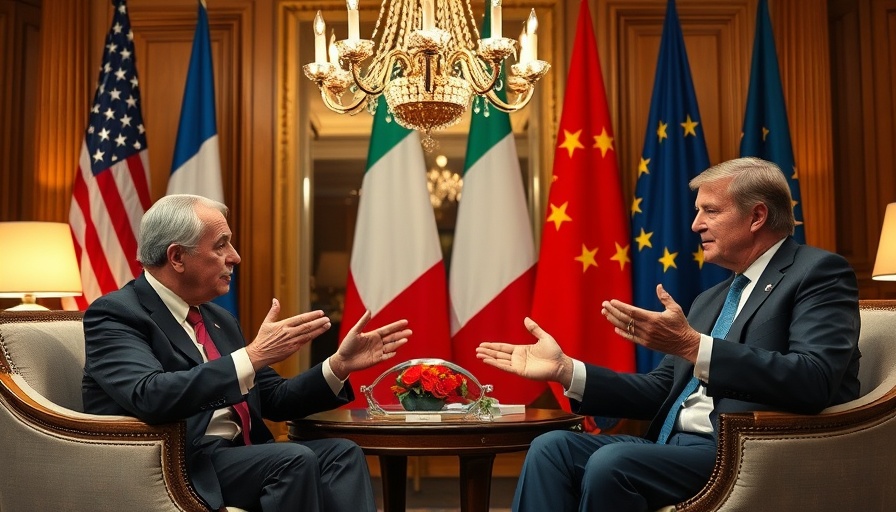
A Diplomatic Turn in Rome
In a significant diplomatic engagement, U.S. Vice President JD Vance visited Italy for critical tariff discussions with Italian Premier Giorgia Meloni. Their meetings held at Chigi Palace, the official residence of the premier, underscored the strengthening ties between the two nations, particularly in the face of ongoing trade tensions with the European Union. As Vance and Meloni convened for their talks, both leaders reiterated their commitment to foster economic cooperation while navigating the complexities of tariffs that have prompted concerns about recession risks.
The Context of Tariff Negotiations
The tariff talks are pivotal, especially since they come on the heels of a joint statement from the White House indicating President Trump’s immediate plans to visit Italy. This development is notable as it highlights the U.S.'s active engagement with Europe, particularly on economic policies that could shape the future of international trade. The tariffs, which have raised eyebrows in both Europe and the U.S., are seen as a double-edged sword: while they aim to protect American industries, they threaten to escalate into a trade war.
Insights on U.S.-Italy Relations
JD Vance's visit occurs within a wider context of fluctuating U.S.-Italy relations, recently characterized by stronger sentiments due to Italy's measures on immigration, praised by President Trump. The leaders' camaraderie was apparent as they exchanged lighthearted quips, illustrating a personal rapport that could benefit negotiations. However, challenges remain, particularly as trade policies evolve and the long-term impacts on both economies come to the forefront.
The Good Friday Service: A Moment of Reflection
Following the discussions, Vance participated in Good Friday services at St. Peter's Basilica, an experience underscored by his personal beliefs as a Catholic convert. With his family alongside him, this religious observance represents a confluence of personal faith and political life, showcasing Vance's multifaceted identity. Scheduled to meet with Cardinal Pietro Parolin, Vatican Secretary of State, Vance’s visit underscores the intersection of faith and diplomacy, highlighting the role of the Vatican in international relations.
Future Predictions: Diplomacy's Role in Economic Stability
Looking ahead, the meeting signifies a potential shift in how the U.S. engages with European partners, particularly regarding trade and economic policy. The looming visit of President Trump could further delineate America’s stance on tariffs. Analysts predict that a collaborative approach focusing on fair trade practices may lead to a reassessment of economic strategies that prioritize growth without compromising international relationships.
Counterarguments: Navigating Complex Trade Relations
However, not everyone views the upcoming tariff discussions positively. Critics argue that increasing tariffs could harm American consumers and destabilize the fragile economic recovery observed post-pandemic. Balancing protectionism with collaborative international trade may continue to pose challenges, and differing opinions on the benefits of such tariffs often complicate dialogue. The necessity for transparent discourse and adjustment of policies to suit both American interests and European concerns seems paramount.
Emotional Resonance: The Power of Place and Faith
The backdrop of the Vatican during Holy Week offers an emotional layer that resonates with many, particularly within the Catholic community. For those observing, the juxtaposition of deep-seated faith with political maneuvering could evoke varying perspectives on the responsibilities of public officials to embody their spiritual values alongside their political commitments. Such moments at historic sites serve as poignant reminders of the legacies that leaders may one day leave behind.
Conclusion: Understanding the Dynamics of Global Relationships
As JD Vance embarks on this pivotal diplomatic journey, the implications of his discussions with Italy extend beyond immediate tariff negotiations. While the essence of trade is rooted in economic survival, the responsibilities of global leaders to foster understanding and partnership in turbulent times cannot be understated. Navigating the complexities of global economics and diplomatic relations requires a thoughtful approach that honors both national interests and international solidarity.
 Add Row
Add Row  Add
Add 




 Add Row
Add Row  Add
Add 

Write A Comment